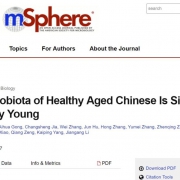Do dietary effects on gut microbiota promote health in older individuals? Reid and colleagues gain insights into microbiota composition across the lifespan
January 22, 2018. By Dr. Gregor Reid
ISAPP Board of Directors member Dr. Gregor Reid recently co-authored a cross-sectional study in a cohort of over 1000 very healthy Chinese participants from 3 to over 100 years of age in order to gain insights on ‘healthy’ microbiota composition and whether this changes with age. Using next-generation sequencing (Illumina MiSeq platform) and large-scale compositional data analysis techniques, the study demonstrated that there was very little difference in the fecal microbiota composition of individuals between the around 30 years of age and around 100—as long as the individuals were extremely healthy.
The concept of consuming live microorganisms that offer a benefit to the host (probiotics), or a substrate that is selectively utilized by host microorganisms conferring a health benefit (prebiotics), to promote health in aging populations is becoming more popular. However, it is not currently known what constitutes a ‘healthy’ gut microbiota composition, or what specific prebiotic/probiotic might help establish it.
Discussing the study results in a Reddit Ask Me Anything session, Reid explains, “It is hard to pin down outcomes to one factor such as food, and which components of those foods are critical, but seeing the super-healthy elderly having the same microbiota profile as the super-healthy young adult might make us see if some food practices from 75 years ago have returned.”
Although the study design (cross-sectional) does not allow for a cause and effect relationship to be established, the results may signify that the similarity of gut microbes across ages is a consequence of an active lifestyle and good diet—in contrast with previous hypotheses that aging per se affected gut microbiota composition. Based on these findings, it is reasonable to hypothesize that reestablishing a dysbiotic microbiota composition in older adults, to mirror that of a 30-year-old, may promote health. Moreover, the results offer an established baseline microbiota composition by which other cohorts with chronic or acute disease may be compared.





